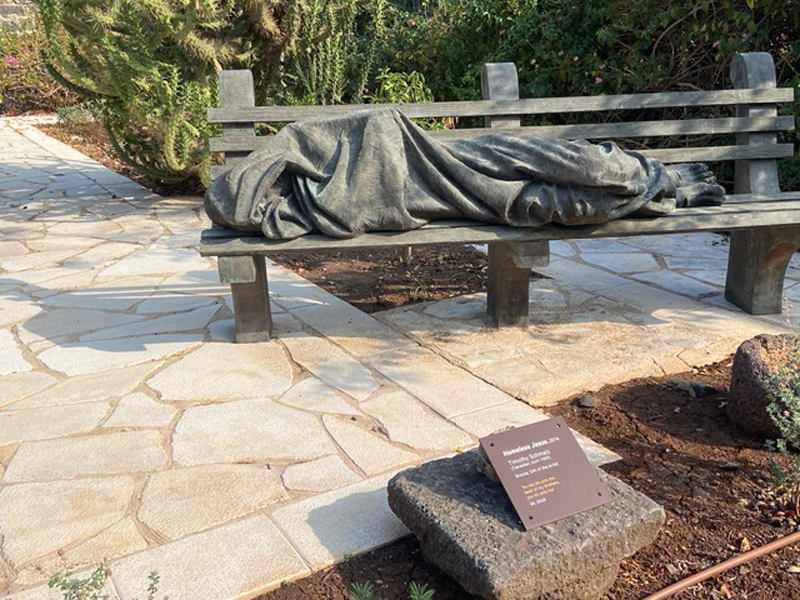By Mark Ellis –

As we traveled the Jericho Road recently leading up toward Jerusalem, our tour group stopped at one of the West Bank settlements perched high on a promontory overlooking the Dead Sea, where I had the opportunity to lead a devotional for our group.
Jesus used this same road as a backdrop to one of his most famous teachings: “The Parable of the Good Samaritan.”
And behold, a certain lawyer stood up and tested Him, saying, “Teacher, what shall I do to inherit eternal life?”
He said to him, “What is written in the law? What is your reading of it?”
So he answered and said, “ ‘You shall love the Lord your God with all your heart, with all your soul, with all your strength, and with all your mind,’ and ‘your neighbor as yourself.’ ”
And He said to him, “You have answered rightly; do this and you will live.”
But he, wanting to justify himself, said to Jesus, “And who is my neighbor?”
Then Jesus answered and said: “A certain man went down from Jerusalem to Jericho, and fell among thieves, who stripped him of his clothing, wounded him, and departed, leaving him half dead.
Now by chance a certain priest came down that road. And when he saw him, he passed by on the other side. Likewise a Levite, when he arrived at the place, came and looked, and passed by on the other side.
But a certain Samaritan, as he journeyed, came where he was. And when he saw him, he had compassion. So he went to him and bandaged his wounds, pouring on oil and wine; and he set him on his own animal, brought him to an inn, and took care of him.
On the next day, when he departed, he took out two denarii, gave them to the innkeeper, and said to him, ‘Take care of him; and whatever more you spend, when I come again, I will repay you.’
So Jesus asks: Which of these three do you think was neighbor to him who fell among the thieves?”
And he said, “He who showed mercy on him.”
Then Jesus said to him, “Go and do likewise.” (Luke 10:25-37)
Improbably, Jesus chose someone who was despised by the Jews to be the hero of this story. A detested Samaritan, who were viewed as idolaters and half-breeds – in today’s context it would be like choosing a Palestinian to be the hero.
The Samaritan gave him medical treatment, brought him to an inn, where he stayed to watch over the man through the night.
When he left, he paid for the room, but told the innkeeper he would pay for any additional expenses – for a complete stranger!
Who loves like this? Who really loves like this? I find this teaching of Jesus to be one of his most challenging on several levels.
As I examine myself and look for myself in this story, I’m sorry to say I would probably be like the religious leaders who passed by, thinking I was too busy to stop and might have even made a rationalization to myself to justify my indifference.
I know this full well because of a situation I found myself in a few weeks before we left on our trip to Israel. I have a favorite spot I like to go running along the coast in San Clemente, California. It is a broad, decomposed granite trail that runs along the coast from North Beach, passing the San Clemente pier, past T Street, all the way to south San Clemente near San Onofre.
It is a beautiful place to walk or run, especially at sunset, when God often paints spectacular colors from his unlimited palette across the broad expanse of sky and ocean.
But in the weeks before we left on our trip, there happened to be a middle-aged homeless woman who set up a camp at the entrance to the trail, so to access this beautiful trail, one is forced to walk by her. For several weeks, I did just that, walking by, pretending not to notice her, just like the religious leaders in Jesus’ parable.
A variety of thoughts go through my mind when I encounter a person like this woman. I think they may be a drug addict or mentally ill. I think they may have shunned offers of help, because they don’t want to live under anyone’s rules. And so I make these judgments and rationalizations, and ultimately decide I’m too busy to interrupt my schedule to get involved.
But reading about the Good Samaritan on the Old Jericho Road, I’m forced to confront my own selfishness, and recognize I can’t love the way the Samaritan did in my natural condition. Only as I am filled with the Spirit, and walking in the Spirit, do I have any capacity to love this way.
Remember the context is the Jewish lawyer asking Jesus what he must do to inherit eternal life. This causes me to consider another uncomfortable layer to the story. Do I have to do something to inherit eternal life?
My theology tells me there is nothing I can do to earn salvation. It’s by grace alone thru faith alone. One of my favorite verses, Ephesians 2:8-9, tells me: For it is by grace that you have been saved through faith, and this is not of yourself, it is a gift of God, lest any man should boast.
But Jesus tells this Jewish expert in the law that to inherit eternal life he must actively demonstrate mercy! Jesus tells him, “Go and do likewise!”
So may I suggest another layer of meaning, that the one who was stripped, beaten, and wounded represents Jesus.
Isaiah 53:5 says: He was wounded for our transgressions,
He was bruised for our iniquities;
The punishment that brought us peace was upon Him,
And by His stripes we are healed.
Jesus taught: Whatever you did for one of the least of these, you did it for me. (Matthew 25:40) That includes all the wounded and broken people who happen to be in my path.
So when I take the time to minister to the homeless person lying on the side of the road I am actually ministering to Jesus.
On the same Israel tour, I notice someone has erected a sculpture along the shore at the Sea of Galilee. It depicts a homeless person wrapped in a blanket, lying on a park bench. The name of the sculpture is “Homeless Jesus.”

The homeless woman I chose to ignore, juxtaposed with this statue of Jesus as a homeless person, overwhelms my feeble comprehension.
Jesus says there is something more to inheriting eternal life than just knowing all the right stuff and obeying a list of rules.
In addition to loving God with all my heart, soul, mind, and strength, I need to love my neighbor by actively demonstrating mercy and compassion to him.
Showing mercy in this parable involved a costly sacrifice of time and money – really being present with this person to care for their needs. Because Jesus is Immanuel – God with us – we need to think about how we become Immanuel to the person who needs His touch.
But when does eternal life begin? I’m taught that eternal life begins when you are born again, not when one dies.
And what has to happen for someone to gain an inheritance? Someone has to die.
I’ve concluded the thing that has to die is my old selfish nature that doesn’t want to stop, that doesn’t want to get involved, that cold-hearted side of me that is indifferent to people’s suffering.
But when I make that sacrifice of time and money to get involved with a wounded and broken person, Jesus says I gain the true riches of eternal life.
So I want to challenge myself and you with something: First, find yourself in the story. If you are like the Samaritan, I bless you and I can learn from your example.
But if you fall short in this area of compassion and mercy like I do, ask yourself, What needs to change in me so I can show this kind of compassion and mercy to my neighbor – or even to a complete stranger?



